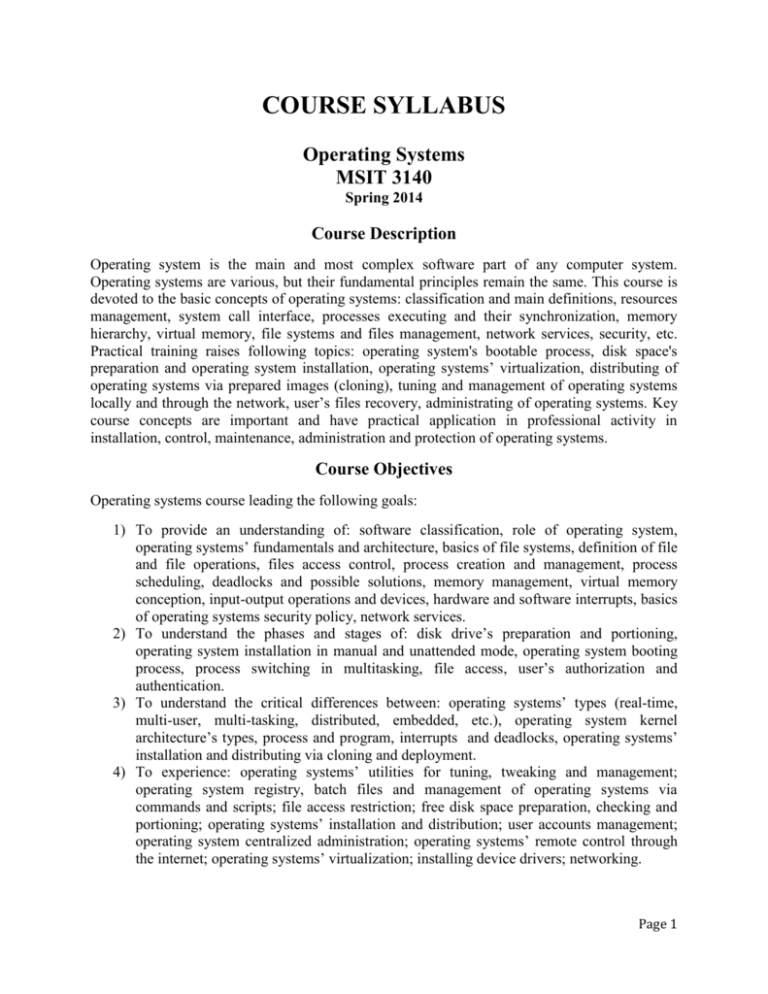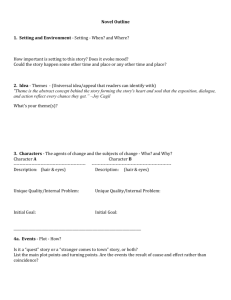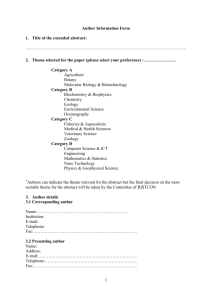Operating systems course leading the following goals
advertisement

COURSE SYLLABUS Operating Systems MSIT 3140 Spring 2014 Course Description Operating system is the main and most complex software part of any computer system. Operating systems are various, but their fundamental principles remain the same. This course is devoted to the basic concepts of operating systems: classification and main definitions, resources management, system call interface, processes executing and their synchronization, memory hierarchy, virtual memory, file systems and files management, network services, security, etc. Practical training raises following topics: operating system's bootable process, disk space's preparation and operating system installation, operating systems’ virtualization, distributing of operating systems via prepared images (cloning), tuning and management of operating systems locally and through the network, user’s files recovery, administrating of operating systems. Key course concepts are important and have practical application in professional activity in installation, control, maintenance, administration and protection of operating systems. Course Objectives Operating systems course leading the following goals: 1) To provide an understanding of: software classification, role of operating system, operating systems’ fundamentals and architecture, basics of file systems, definition of file and file operations, files access control, process creation and management, process scheduling, deadlocks and possible solutions, memory management, virtual memory conception, input-output operations and devices, hardware and software interrupts, basics of operating systems security policy, network services. 2) To understand the phases and stages of: disk drive’s preparation and portioning, operating system installation in manual and unattended mode, operating system booting process, process switching in multitasking, file access, user’s authorization and authentication. 3) To understand the critical differences between: operating systems’ types (real-time, multi-user, multi-tasking, distributed, embedded, etc.), operating system kernel architecture’s types, process and program, interrupts and deadlocks, operating systems’ installation and distributing via cloning and deployment. 4) To experience: operating systems’ utilities for tuning, tweaking and management; operating system registry, batch files and management of operating systems via commands and scripts; file access restriction; free disk space preparation, checking and portioning; operating systems’ installation and distribution; user accounts management; operating system centralized administration; operating systems’ remote control through the internet; operating systems’ virtualization; installing device drivers; networking. Page 1 5) To work together with others to complete a group tasks. Students apply course's material to solve following group problems: operating systems’ centralized installing, maintenance and administration. Reading materials Text Books 1) Andrew S. Tanenbaum, Modern Operating Systems, December 21, 2007; ISBN10: 0136006639; ISBN-13: 978-0136006633; Third edition 2) William Stallings, Operating Systems: Internals and Design Principles, April 19, 2008; ISBN-10: 0136006329; ISBN-13: 978-0136006329; Sixth edition 3) Andrew S. Tanenbaum, Operating Systems Design and Implementation, January 14, 2006; ISBN-10: 0131429388; ISBN-13: 978-0131429383; Third edition Articles 1) Command-line reference: http://www.microsoft.com/resources/documentation/windows/xp/all/proddocs/enus/arp.mspx?mfr=true 2) Windows Batch Scripting: http://en.wikibooks.org/wiki/Windows_Batch_Scripting 3) Converting DOS Batch Files to Shell Scripts: http://tldp.org/LDP/abs/html/dosbatch.html 4) Windows Sysinternals: http://technet.microsoft.com/en-us/sysinternals 5) Windows WMIC command line command: http://www.computerhope.com/wmic.htm 6) Using the System Preparation Tool (Sysprep) in an Image-Based Installation: http://www.petri.co.il/using_sysprep_in_an_image_based_installation.htm 7) Create a windows XP image for many different hardware: http://www.fogproject.org/wiki/index.php?title=Create_a_windows_XP_image_for_man y_different_hardware 8) MySysprep 2: http://www.tsaysoft.com/mysysprep2/ Weekly Assignment Schedule 1. Week/Class One: Date: February 6, 2014 Topics or Theme: Operating systems’ introduction. Operating systems and software classification. Operating systems’ definitions and functions. 2. Week/Class Two: Date: February 13, 2014 Topics or Theme: Operating systems’ architecture. Operating systems’ kernel and layers. Kernel and user mode. Operating systems’ kernel types. Page 2 3. Week/Class Three: Date: February 20, 2014 Topics or Theme: Operating systems’ evolution. Operating systems’ interfaces. 4. Week/Class Four: Date: February 27, 2014 Topics or Theme: File system and its structure. File’s definition. Files’ access control. File’s types. File operations and file management. 5. Week/Class Five: Date: March 6, 2014 Topics or Theme: Processes and streams. Processes’ classification. Process states. Processes’ scheduling. Deadlocks and possible solutions. 6. Week/Class Six: Date: March 13, 2014 Topics or Theme: Memory management. Memory addressing. Logical and virtual memory. Paging. Segmentation. 7. Week/Class Seven: Date: March 20, 2014 Topics or Theme: Input-output processes and devices. Input-output devices’ classification and basics. Interrupts. 8. Week/Class Eight: Date: March 27, 2014 Topics or Theme: Operation systems’ security. Security policies. Basic operation systems security’s technologies. 9. Week/Class Nine: Date: April 3, 2014 Topics or Theme: Operating systems’ management via commands. Command line and command line utilities. Third party command line software. Windows Management Instrumentation (WMI) Command Line (WMIC). Assignment: Reading: Articles 1, 2, 3, 4, 5 10. Week/Class Ten: Date: April 10, 2014 Topics or Theme: Operating systems’ remote control. Remote desktop. Third party remote control’s utility. Page 3 11. Week/Class Eleven: Date: April 17, 2014 Topics or Theme: Operating systems’ tuning and tweaking. System registry. Remote operating systems’ management and control. 12. Week/Class Twelve: Date: April 24, 2014 Topics or Theme: System Preparation Tool (Sysprep) in an Image-Based Installation. Sysprep command line options. Unattended installation’s answer file creation. Preparing an operating system image file using Sysprep and ImageX. Assignment: Reading: Articles 6, 7, 8 13. Week/Class Thirteen: Date: May 1, 2014 Topics or Theme: Windows Deployment Services (WDS), Microsoft Deployment Toolkit (MDT), and Windows Automated Installation Kit (AIC). 14. Week/Class Fourteen: Date: May 8, 2014 Topics or Theme: Antivirus data protection’s software and firewalls. Manual virus deletion. User’s data recovery. Assignment: Presentation Paper Grading Procedure (This will be explained in detail during the first class) 1) Participation in class 20% Attendance in class is required. Be on time. Turn off cell phones. Participate in discussions and exercises. 2) Examination (in-class multiple choice test) 30% 3) Group project: 50% Students will be assigned into groups and complete a project that includes both an inclass presentation and a written analytical paper (4-5 pages, good grammar and spelling and organization). Page 4 Grading based on the following factors: Organization of material Application of course content and material Utilization of outside course resources Creativity of class presentation. The goal of the group project is to work as a team utilizing the skills of each team member. The main idea consists in the joint and most effective solution of specific practical objectives in the field of installation, control and maintenance of operating systems, using strengths of each team’s member and ability creative present the results of team’s work. Grade scale Number to letter A+ A AB+ B BC+ C Failing 98-100 93-97 90-92 87-89 83-86 80-82 77-79 73-76 72 and below Letter to number 98 95 92 88 85 82 78 75 72 Academic Policies Academic integrity is highly valued at Clark. Research, scholarship and teaching are possible only in an environment characterized by honesty and mutual trust. Academic integrity requires that your work be your own. Because of the damage that violations of academic integrity do to the intellectual climate of the University, they must be treated with the utmost seriousness and appropriate sanctions must be imposed. The maintenance of high standards of academic integrity is the concern of every member of the University community. Several ways in which academic integrity is violated are outlined below: Cheating has three principal forms: 1. Unauthorized use of notes, text, or other aids during an examination or in performance of course assignments. 2. Copying the work of another. 3. Handing in the same paper for more than one course unless the faculty members involved give their explicit permission to do so. Plagiarism refers to the presentation of someone else’s work as one’s own, without proper citation of references and sources, whether or not the work has been previously Page 5 published. Submitting work obtained from a professional term paper writer or company is plagiarism. Claims of ignorance about the rules of attribution, or of unintentional error are not a defense against a finding of plagiarism. Unauthorized collaboration refers to work that students submit as their own but which arrived at through a process of collaboration without the approval of the professor. Since standards on appropriate or inappropriate collaboration may vary widely among individual faculty, students should make certain they understand a professor's expectations before collaborating on any class work. Alteration or fabrication of data includes the submission or changing of data obtained by someone else or not actually obtained in the performance of an experiment or study, except where allowed by the professor. It also includes the changing of data obtained in the performance of one's research. Page 6








